Topics
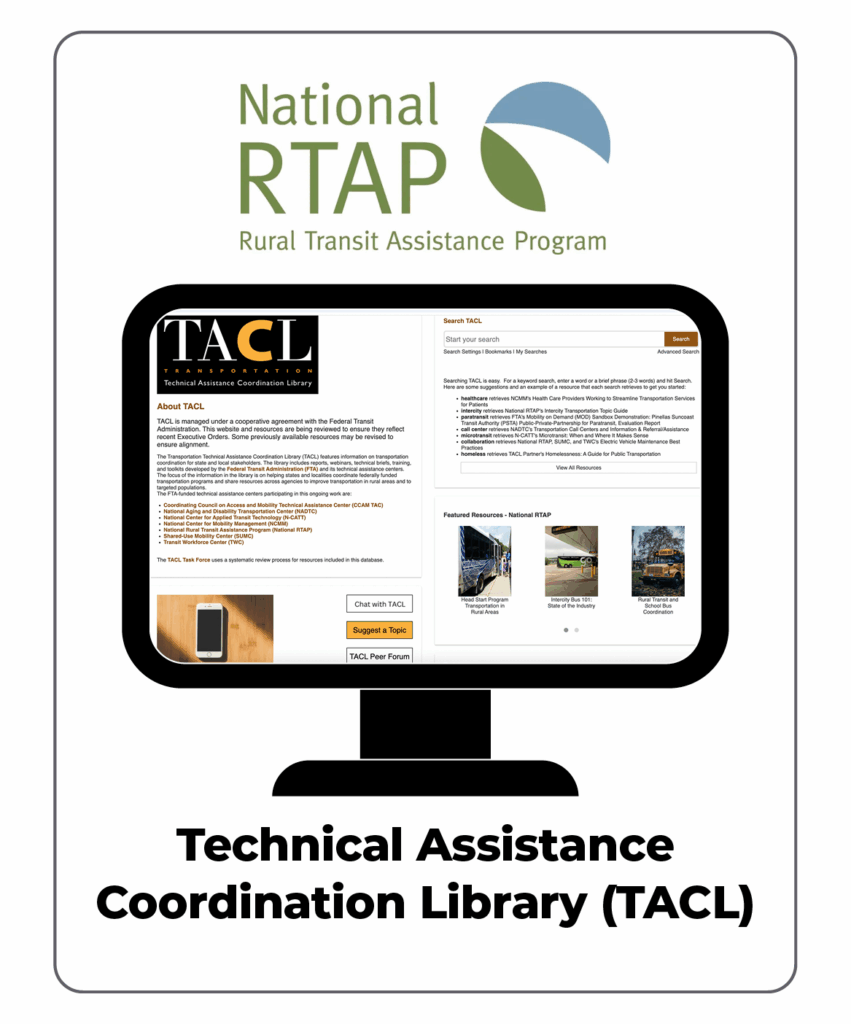
Technical Assistance Coordination Library (TACL)
National Rural Transit Assistance Program
TOPICS: Apprenticeship , Career Pathways , Community Engagement , Hiring and Recruitment , Labor-Management Partnerships , Low-No , Mentorship , Policy and Planning , Procurement , Program Evaluation and ROI , Retention , Safety and Health , Trainer and Mentor Development , Training , Workforce Shortage
Transportation Technical Assistance Coordination Library (TACL)
The Transportation Technical Assistance Coordination Library (TACL) provides a viable methodology and platform for access and findability of rural and tribal transit coordination resources across a broad range of transportation technical assistance centers and the Federal Transit Administration (FTA).
The FTA-funded Technical Assistance (TA) Centers participating in this ongoing work are:
- National Aging and Disability Transportation Center (NADTC)
- National Center for Applied Transit Technology (N-CATT)
- National Center for Mobility Management (NCMM)
- National Rural Transit Assistance Program (National RTAP)
- Shared Use Mobility Center (SUMC)
- Transit Workforce Center (TWC)
The TACL Task Force uses a systematic review process for resources included in the database. New resources will be added on a quarterly basis. Let us know if you would like to serve as a peer reviewer for our resources.
Why was TACL created?
The United States Government Accountability Office (GAO) published Public Transportation: Enhanced Federal Information Sharing on Coordination Could Improve Rural Transit Services in January 2020. GAO recommended that FTA “develop a communication plan that will effectively share information with state and local stakeholders on coordination opportunities in an accessible and informative way.” This effort was created to improve interagency resource coordination between FTA and its five TA Centers.
How can TACL be used?
TACL resources can be used to identify high quality technical assistance on transportation coordination. The resources can be used for research, training, practice, operations, planning, and other purposes. We encourage authors to cite TACL resources.
Ready to get started?
Visit http://transportation-tacl.org. Click on the Training tab at the top for instructions.
If you have a question about TACL, or if you would like to be considered to become a TACL peer reviewer, please contact info@nationalrtap.org
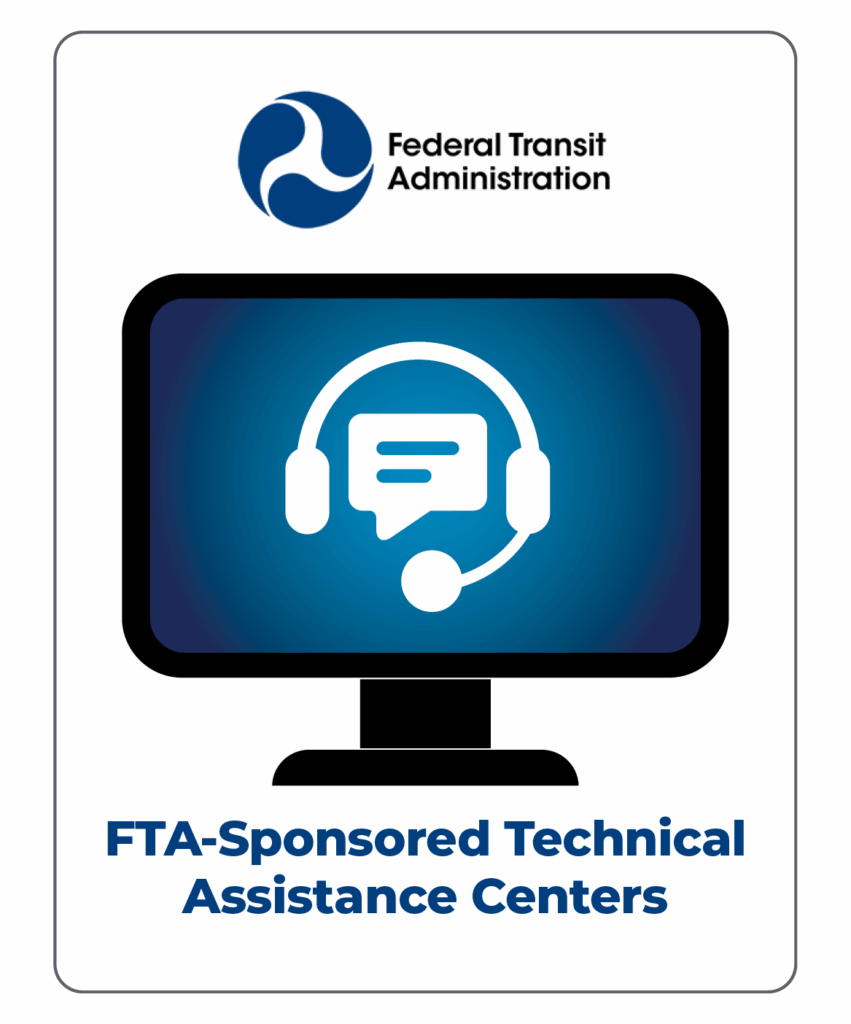
FTA-Sponsored Technical Assistance Centers
Federal Transit Administration
TOPICS: Apprenticeship , Career Pathways , Community Engagement , Hiring and Recruitment , Labor-Management Partnerships , Low-No , Mentorship , Policy and Planning , Procurement , Program Evaluation and ROI , Retention , Safety and Health , Trainer and Mentor Development , Training , Workforce Shortage
FTA’s Technical Assistance and Workforce Development Program (49 U.S.C. § 5314) and the Public Transportation Innovation Program (49 U.S.C. § 5312) fund technical assistance centers through national nonprofit organizations across a number of areas to improve public transportation. These nonprofit partners and the work they do play a critical role in supporting public transit agencies. Their services help to:
- Improve transportation for older adults and people with disabilities
- Drive the adoption of mobility management and related promising practices
- Accelerate innovative mobility practices and strategies
- Support rural communities
- Leverage new transit technologies
- Train the public transit workforce
- Provide workforce development technical assistance
- Support research projects selected by the transit industry that address day to day issues
- Support the transit industry meet safety regulations
National Center for Applied Transit Technology (N-CATT)
The National Center for Applied Transit Technology (N-CATT) delivers expert, focused technical assistance to transit agencies and organizations in rural areas and small cities to use or develop transit technologies and innovations that make services more cost-effective and efficient. N-CATT’s work supports FTA’s mission and focus on innovation by developing and supporting transit programs and services in rural and small-city America.
National Aging and Disability Transportation Center (NADTC)
The National Aging and Disability Transportation Center (NADTC) is a national technical assistance center funded by FTA with guidance from the U.S. Department of Health and Human Services’ Administration for Community Living to promote the availability of transportation options that serve the needs of people with disabilities, seniors and caregivers with a focus on the Section 5310 program and other transit investments. NADTC supports the delivery of more effective, efficient, high-quality and coordinated specialized transportation services that maximize federal investments. NADTC provides technical assistance, information and referral; develops field training; implements interactive communication and outreach strategies; and supports communities in assessing their needs and developing innovative transportation solutions.
National Rural Transit Assistance Program (National RTAP)
The National Rural Transportation Assistance Program (RTAP) was established by FTA in 1987 to provide a wide range of professional services and products. National RTAP addresses the training and technical assistance needs of rural and tribal transit programs across the nation and supports state RTAP programs. National RTAP provides comprehensive free technical assistance programs and resources including training materials, webinars, newsletters and technical briefs, peer resources, research, and innovative technology initiatives. The National RTAP also manages the Transportation Technical Assistance Coordination Library (TACL), which provides a sustainable methodology and platform to access resources across a diverse range of transportation technical assistance centers and FTA.
Shared-Use Mobility Center (SUMC)
The Shared-Use Mobility Center is a public-interest organization dedicated to achieving equitable, affordable, and environmentally sound mobility across the US through the efficient sharing of transportation assets. By connecting the public and private sectors, piloting programs, conducting new research, and providing policy and technical expertise to cities and regions, SUMC seeks to extend the benefits of shared mobility for all. The Shared Mobility 2030 Action agenda includes improving access to public transit, on-demand shuttles or buses, ride-on-demand services, carpooling and vanpooling, and carsharing, bikesharing and scooter-sharing.
Coordinating Council on Access and Mobility (CCAM)
The strategic goal of CCAM, operated but the Community Transportation Association of America, is to support federal agencies, their grantees, partners, and stakeholders in improving transportation access for people with disabilities, older adults, and individuals of low income. CCAM promotes and facilitates human services transportation, public transit, and non-emergency medical transportation (NEMT) coordination that advances people’s access to everyday destinations.
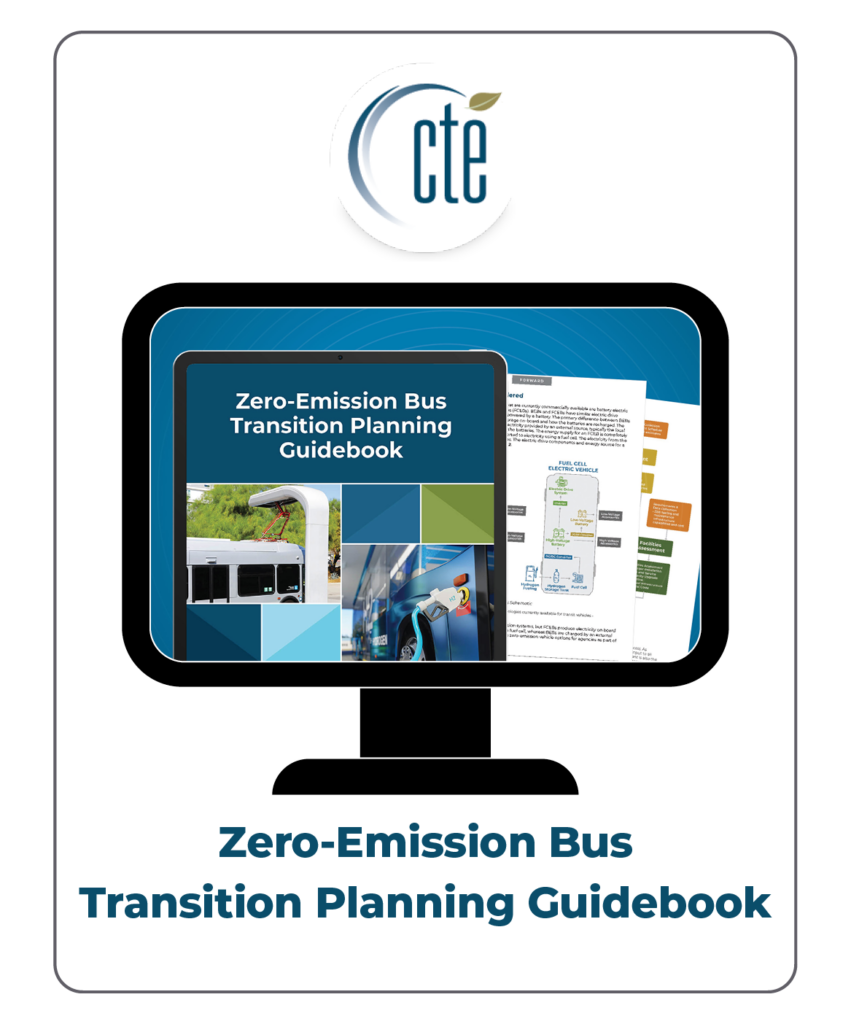
Low-No Bus Transition Planning Guidebook
The Center for Transportation and the Environment
November 2024
TOPICS: Low-No , Policy and Planning , Procurement , Training
Transitioning to a ZEB fleet requires thorough planning and consideration of the elements that are unique to ZEBs, such as range limitations, higher vehicle costs, charging and/or hydrogen infrastructure, and operator and maintenance workforce development. Failing to plan around these issues may result in added costs for bus and infrastructure purchases, project delays, service concerns, and operational challenges as low-no become a larger and larger portion of the fleet.
A properly developed Low-No Transition Plan can help overcome these challenges. This Guidebook is intended to give public transit fleet operators the knowledge necessary to plan for a full fleet transition to low-no technologies.
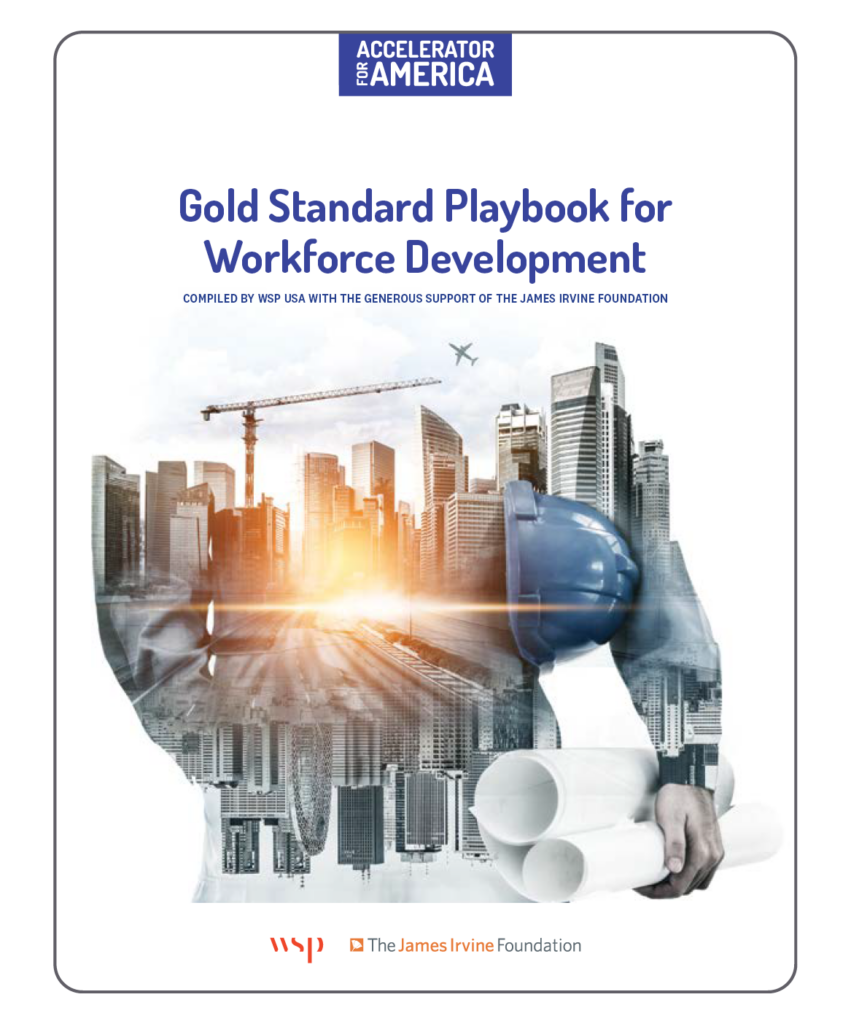
Gold Standard Playbook for Workforce Development
Accelerator for America
August 2024
This Workforce Development Playbook – a menu of malleable strategies and tactics that can be applied in different situational contexts – is meant to serve two purposes:
- To document best practices in workforce development focusing on California but with applicability nationally and sources.
- To set the first “Gold Standard” guiding owners who want to incorporate workforce development goals into their infrastructure projects.
To develop the Playbook, WSP and Accelerator for America (AFA) supported by The James Irvine Foundation, gathered information on current standards, practices, and barriers to workforce development efforts through interviews with key stakeholders across the industry in California, including project owners, community benefit organizations (CBOs), and government leaders.
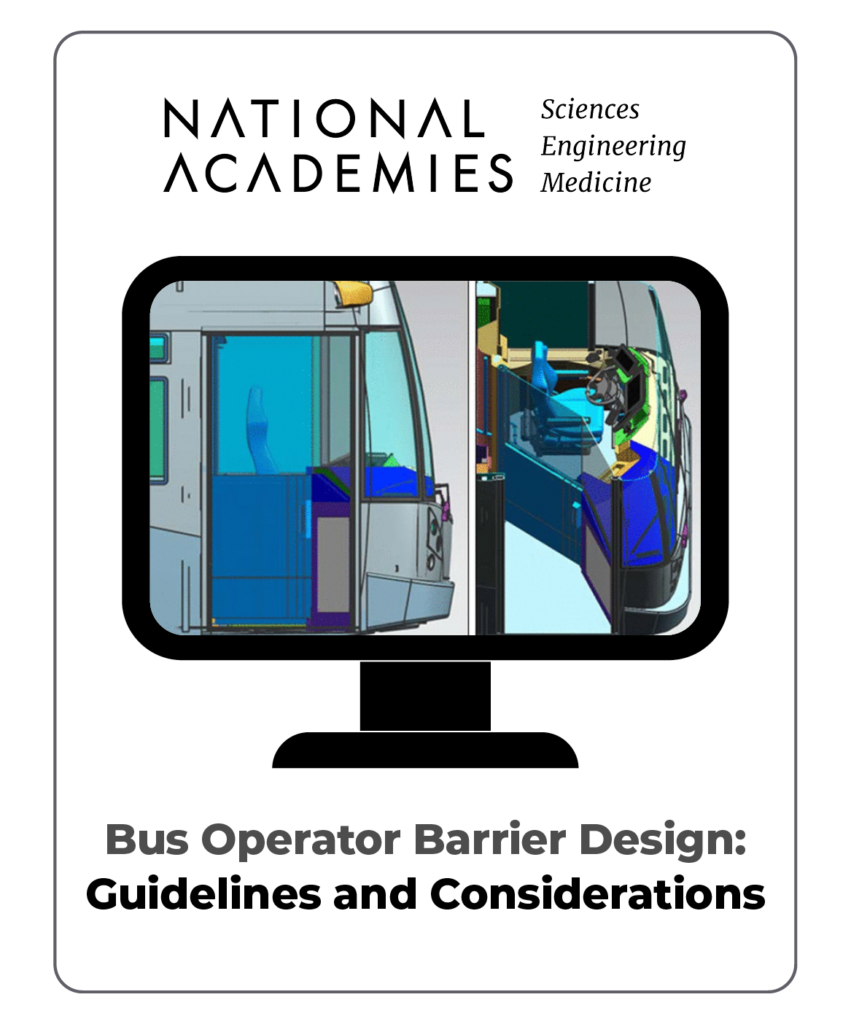
Bus Operator Barrier Design: Guidelines and Considerations
Transit Cooperative Research Program
July 2024
TOPICS: Policy and Planning , Procurement , Safety and Health
The importance of security barriers for transit bus operators became even clearer after the fatal attack on a Tampa, Florida, bus operator in 2019. The need for security barriers was reinforced by a serious attack on another operator for that same system later that year. While these are two extreme examples, they are likely not unique, as many assaults against transit workers have been underreported in the past. Another important but more pernicious risk to bus operator health is viral and bacterial infection.
TCRP Research Report 249: Bus Operator Barrier Design: Guidelines and Considerations provides information and guidance for North American public transportation agencies, standards committees, and government and non-government policymaking organizations on designing, procuring, and installing bus operator barriers to prioritize the health and safety of essential operators and the public they serve.
Contributor(s): National Academies of Sciences, Engineering, and Medicine; STYL&TECH; International Transportation Learning Center; Transportation Research Board; Transit Cooperative Research Program; Andrew Krum; Scott Tidwell; Joshua Skole; Erin Mabry; Aditi Manke; Tarah Crowder; Christy Campoll
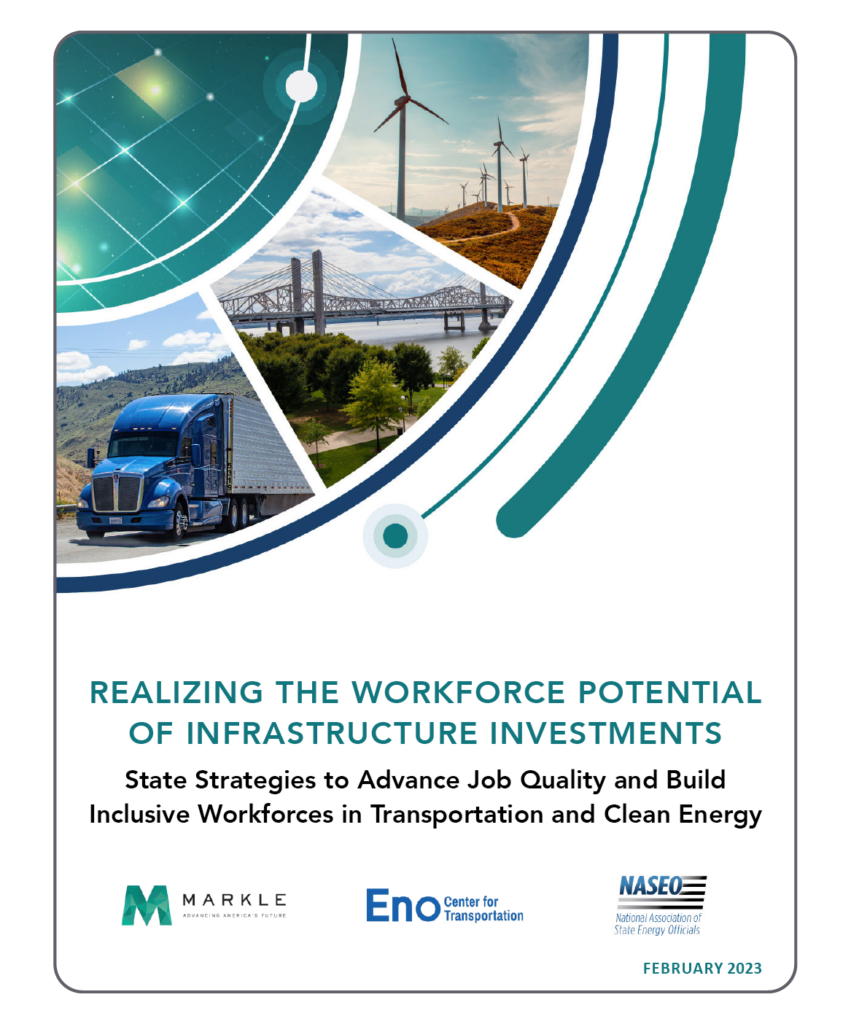
Realizing the Workforce Potential of Infrastructure Investments
This report details strategies for states to realize the workforce and job quality potential of infrastructure investments in critical sectors, particularly those poised for significant additional investments through the IIJA and IRA. The report explains specific funding streams on which states can capitalize and outlines a framework for priority actions that states can take to foster broad opportunity to benefit from good quality jobs connected to state spending in two of the most significant infrastructure sectors. The framework highlights examples of models and uses of these strategies from around the country, including a summary of instances of public infrastructure agencies embedding job quality and workforce aims into competitive procurement processes to influence private sector practices.
Markle; Eno Center for Transportation; National Association of State Energy Officials
February 2023
TOPICS: Policy and Planning , Procurement
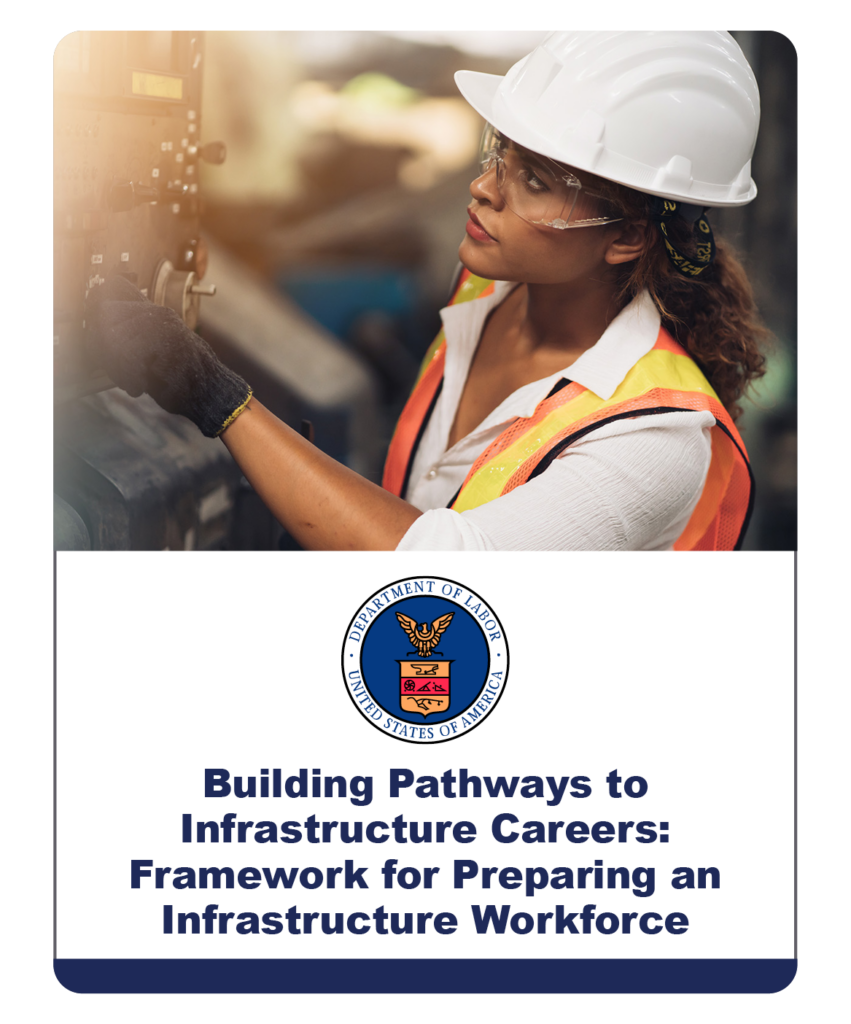
Building Pathways to Infrastructure Careers: Framework for Preparing an Infrastructure Workforce
This resource provides a framework for all workforce stakeholders, including infrastructure project leads, to engage the public workforce system in implementing the Bipartisan Infrastructure Law with strong workforce commitments and proven strategies that produce high-quality education, training, and employment opportunities for all workers.
U.S. Department of Labor, Employment and Training Administration
October 2022
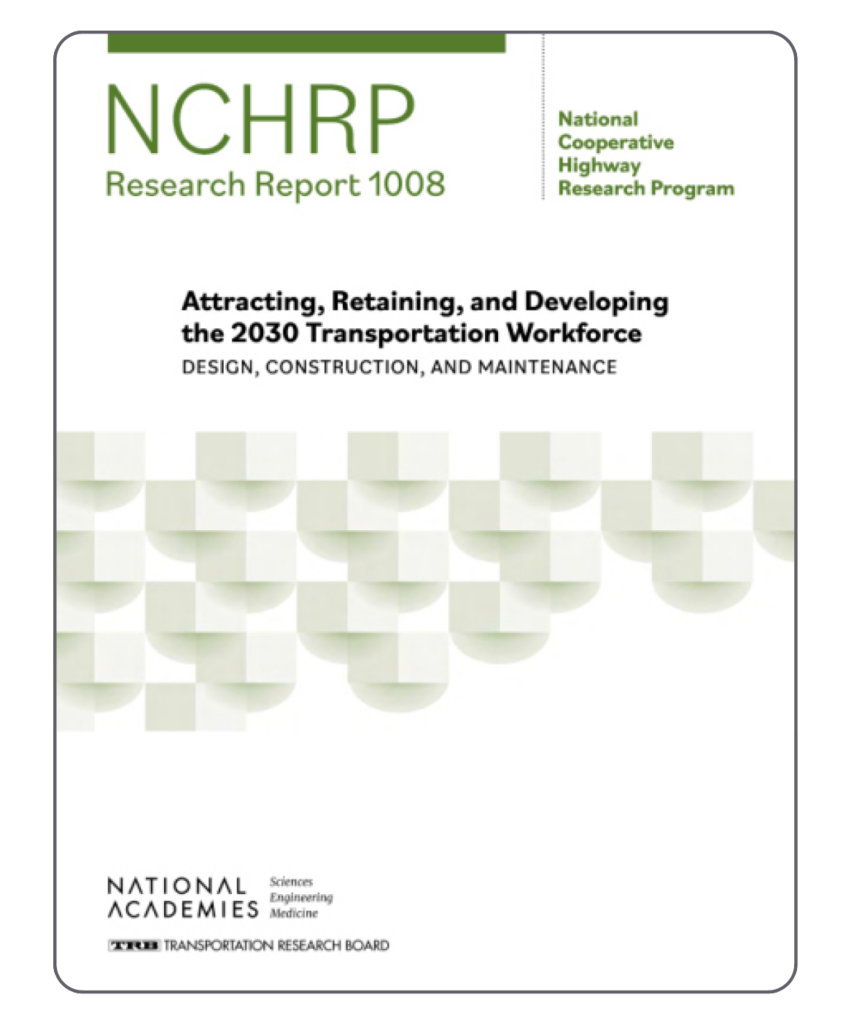
Attracting, Retaining, and Developing the 2030 Transportation Workforce
This report provides a guide with specific strategies and action plans to help agencies identify and address workforce needs through 2030 and beyond.
National Cooperative Highway Research Program
October 2022
State departments of transportation are responsible for providing a safe, efficient, and effective transportation system of infrastructure and services. To meet these responsibilities, transportation agencies need a highly skilled workforce with the expertise required to identify and address current transportation needs while also being prepared to address the challenges of the future.
Contributor(s): National Academies of Sciences, Engineering, and Medicine; Transportation Research Board; National Cooperative Highway Research Program; Candace Blair Cronin; Allison Alexander; Grace Arnold; Juan Carlos Batarse; Kelly Dray; Sasha Iliev; Jessica Jenkins; Erik Smallwood; Rachel Smart; Jake Streng; Mara Campbell; Susan Gallagher; Tyler Reeb; Tom O’Brien; Glenn McRae
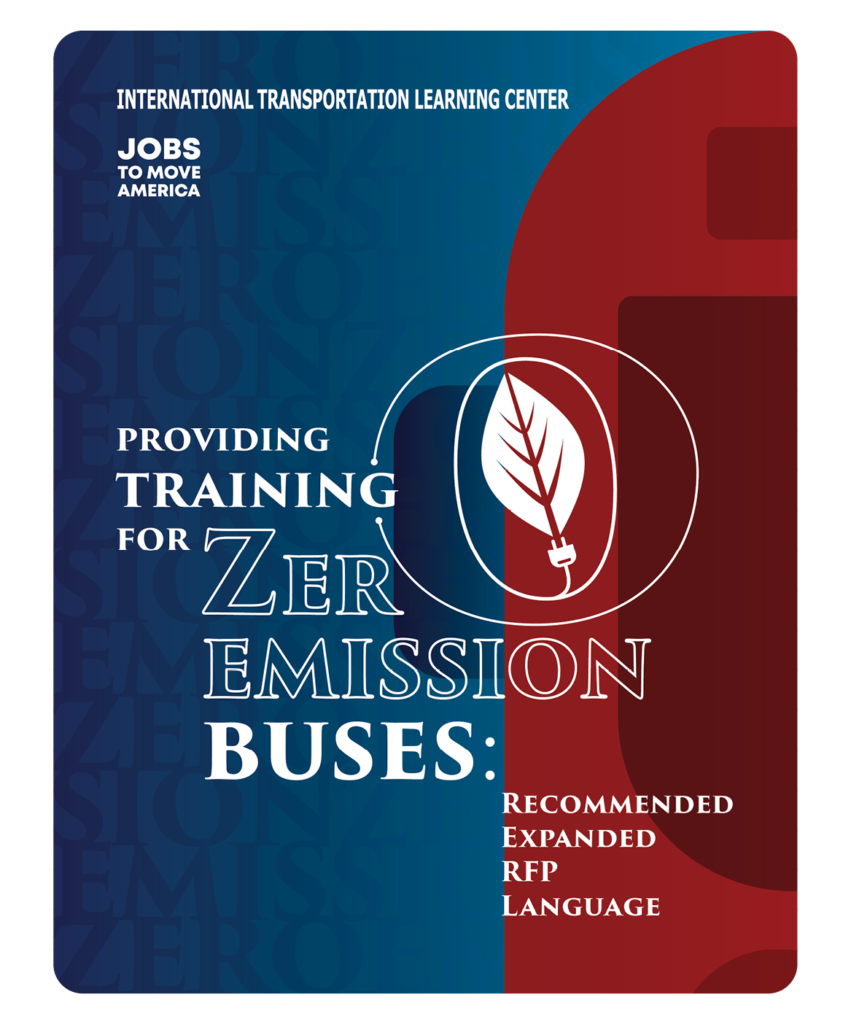
Providing Training for Zero Emission Buses: Recommended Expanded RFP Language
This document includes recommended language for agencies to build robust training procurement into their ZEB Request for Proposals. It is intended to be used as a starting point for agencies to tailor their training procurement to suit their specific needs.
International Transportation Learning Center; Jobs to Move America
February 2022
TOPICS: Low-No , Procurement , Training
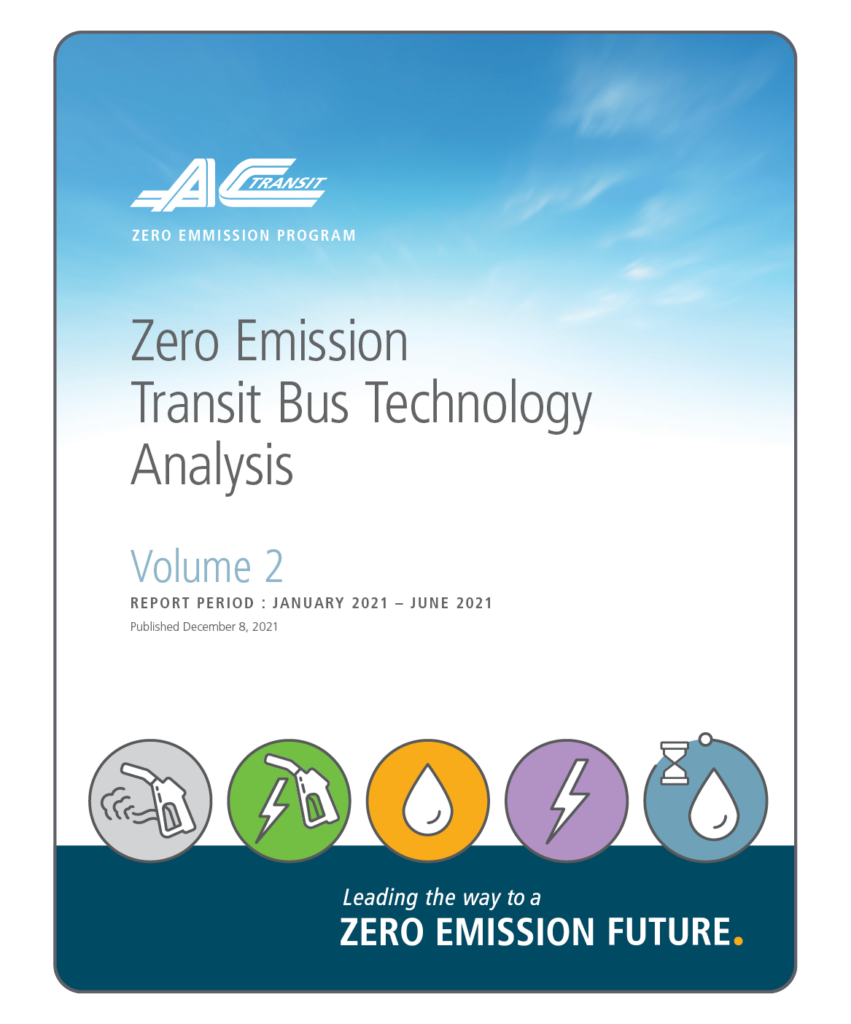
Zero Emission Transit Bus Technology Analysis Volume 2
This report, Volume 2, is the second edition of the Zero Emission Transit Bus Technology Analysis (ZETBTA) which includes results from the fuel-cell electric bus (FCEB), battery electric bus (BEB), diesel hybrid bus, and conventional diesel bus technologies control fleet. It integrates lessons learned and best practices gleaned from AC Transit’s extensive experience in deploying ZEB technologies, including developing innovative workforce training programs, data integration and management, and transit deployment viability.
AC Transit
December 2021
TOPICS: Low-No , Procurement , Training
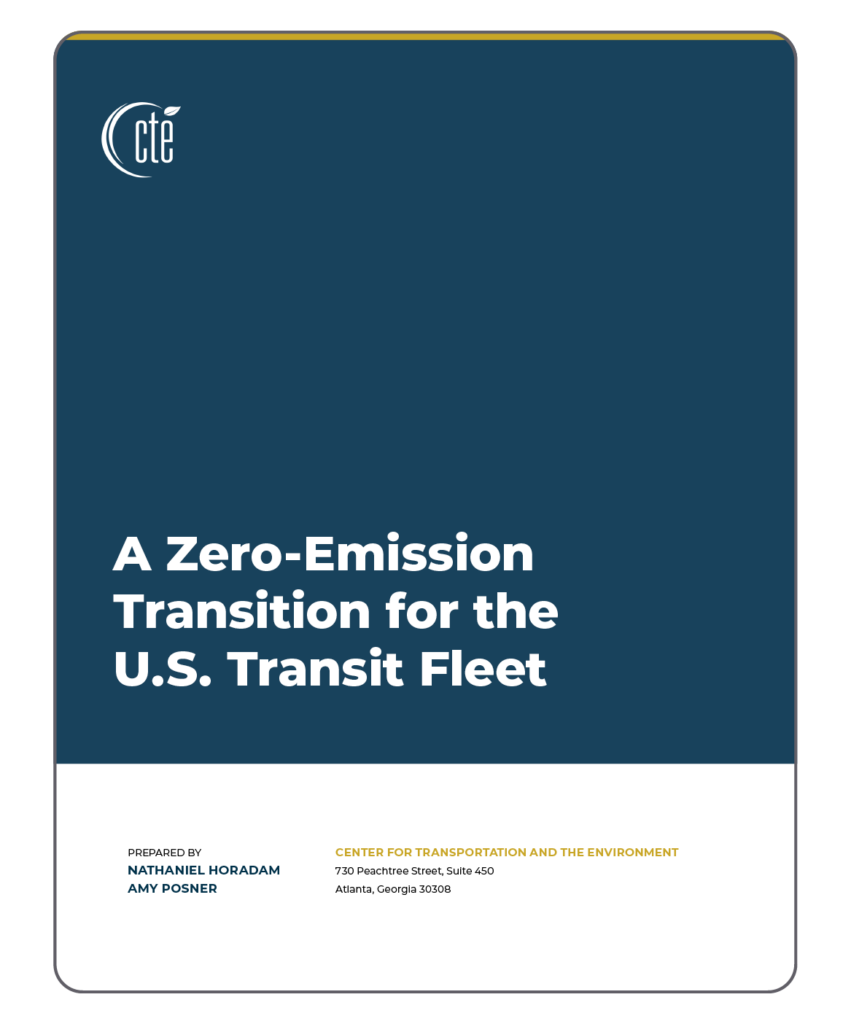
A Zero-Emission Transition for the U.S. Transit Fleet
This report offers a roadmap for federal lawmakers in support of making a complete transition to zero-emission vehicles in transit, including an accounting of estimated agency costs, key assumptions underpinning those figures, acknowledgement of limitations, and workforce development considerations.
Center for Transportation and the Environment
May 2021
TOPICS: Low-No , Policy and Planning , Procurement , Training
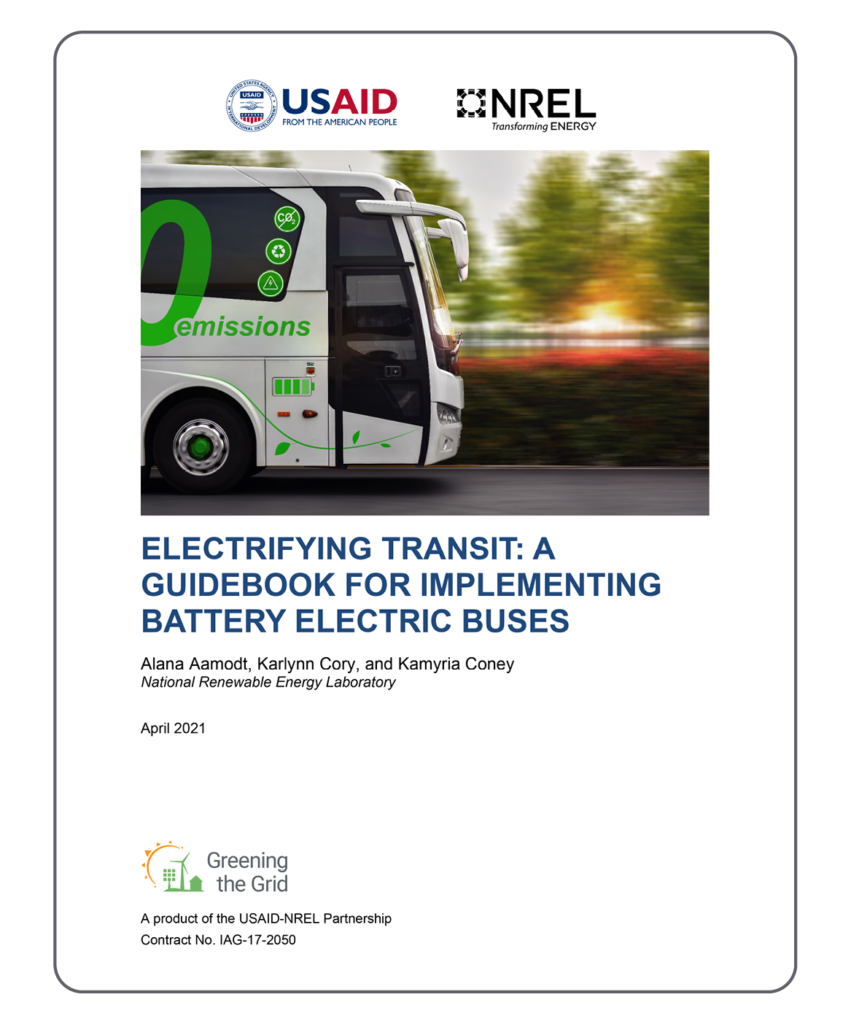
Electrifying Transit: A Guidebook for Implementing Battery Electric Buses
This guidebook assists stakeholders with interest in deploying battery-electric buses by describing decisions and considerations required for successful BEB implementation. It includes information about the benefits and barriers of BEBs, BEB basics, charging infrastructure, operation and maintenance, and costs.
United States Agency for International Development; National Renewable Energy Laboratory
April 2021
TOPICS: Low-No , Procurement
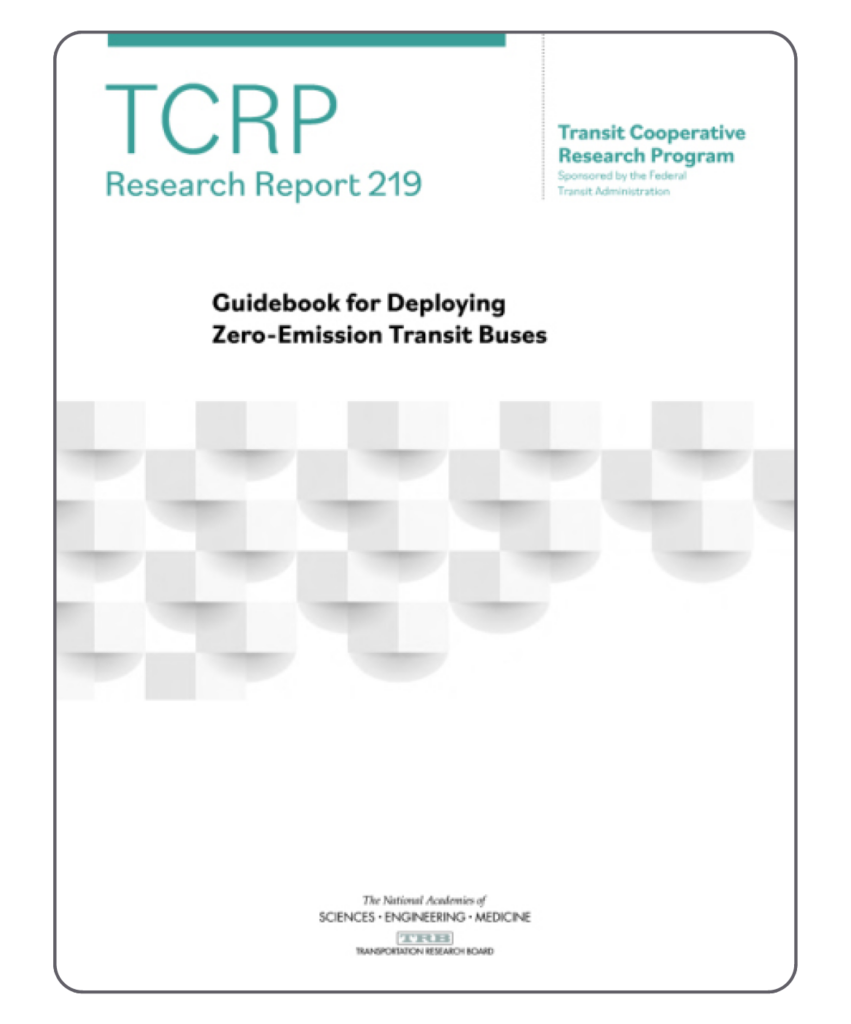
Guidebook for Deploying Zero-Emission Transit Buses
The TCRP Research Report 219: Guidebook for Deploying Zero-Emission Transit Buses is designed to provide transit agencies with information on current best practices for ZEB deployments and lessons learned from previous deployments, industry experts, and available industry resources.
Transportation Cooperative Research Program
January 2021
TOPICS: Low-No , Policy and Planning , Procurement
Contributor(s): National Academies of Sciences, Engineering, and Medicine; Transportation Research Board; Transit Cooperative Research Program; Meredith Linscott; Amy Posner
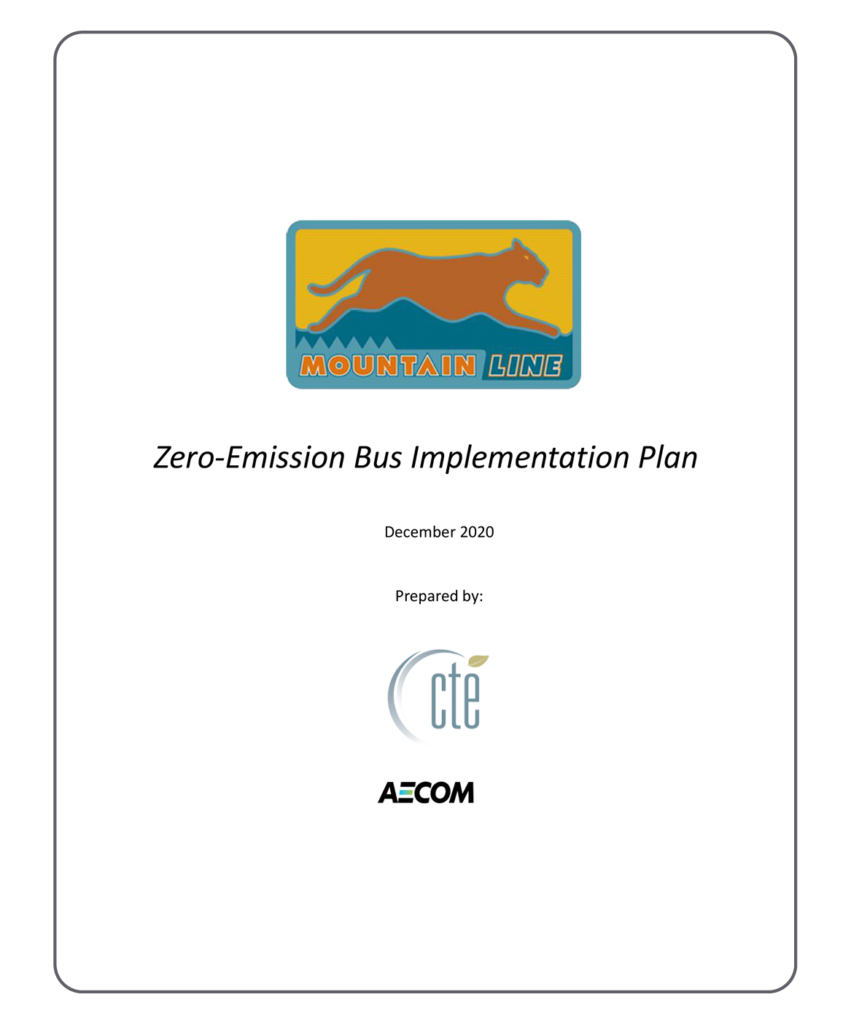
Mountain Line Zero-Emission Bus Implementation Plan
This is the Zero Emission Bus (ZEB) Implementation Plan prepared by the Northern Arizona intergovernmental Public Transportation Authority (referred to as Mountain Line) in contract with the Center for Transportation and the Environment (CTE) with the aim of identifying a zero-emission roadmap for full-scale deployment.
Center for Transportation and the Environment; AECOM
December 2020
TOPICS: Low-No , Procurement , Safety and Health , Training
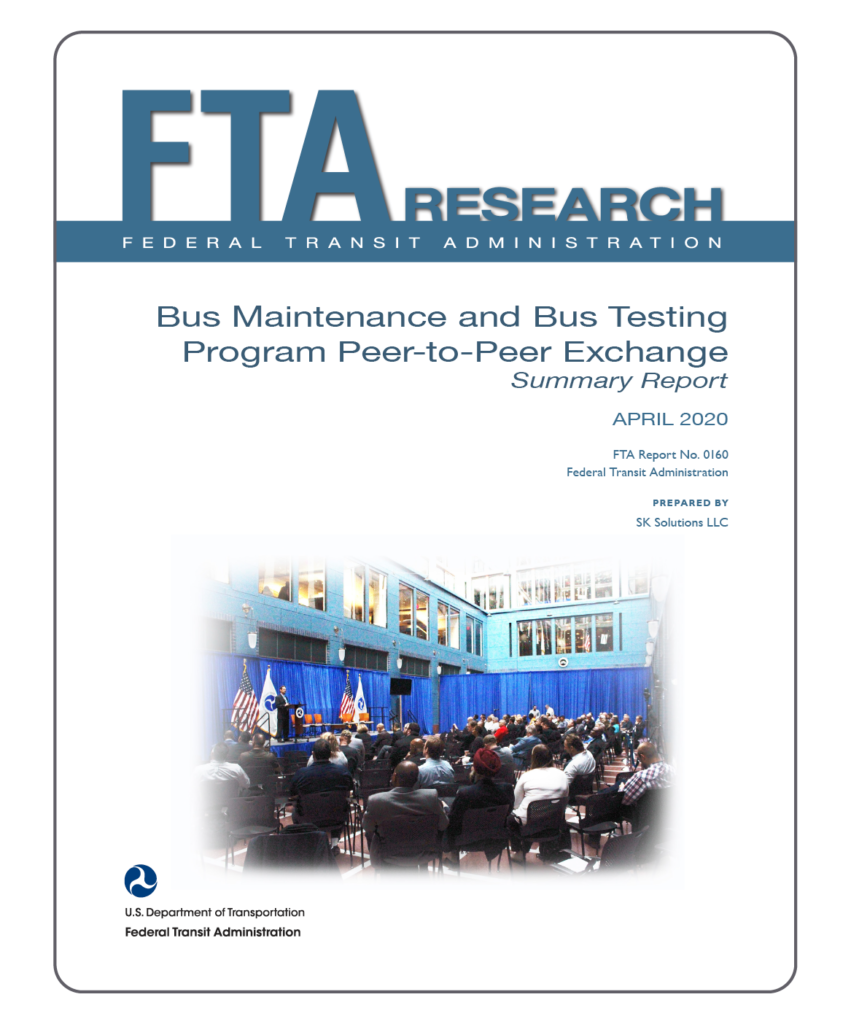
Bus Maintenance and Bus Testing Program Peer-to-Peer Exchange
This report presents a summary of the bus maintenance worker training peer exchange, hosted by the Federal Transit Administration (FTA). Significant shifts in the types of transit buses being procured (e.g., from traditional buses to alternative fuel/low- and no-emission buses) require new and different types of frontline worker training. Through the peer exchange, stakeholders, including industry representatives, shared knowledge about bus maintenance worker training and discussed best practices for developing the next generation of highly-skilled bus technicians.
Federal Transit Administration
May 2020
TOPICS: Hiring and Recruitment , Low-No , Policy and Planning , Procurement , Training
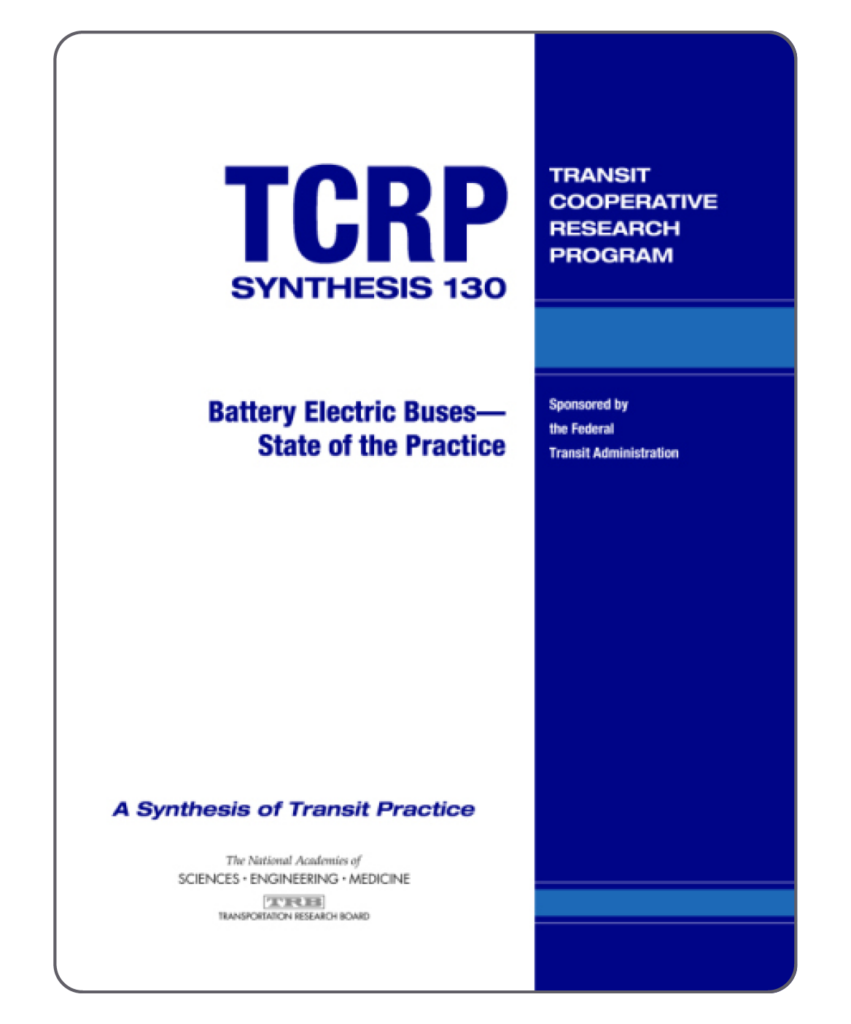
Battery Electric Buses—State of the Practice
This report documents current practices of transit systems in the planning, procurement, infrastructure installation, operation, and maintenance of battery electric buses (BEBs). The synthesis is intended for transit agencies that are interested in understanding the potential benefits and challenges associated with the introduction and operation of BEBs.
Transit Cooperative Research Program
March 2018
TOPICS: Low-No , Procurement
Contributor(s): National Academies of Sciences, Engineering, and Medicine; Transportation Research Board; Transit Cooperative Research Program Synthesis Program; Synthesis Program; Transit Cooperative Research Program; Jason Hanlin; Darby Reddaway; Julia Lane
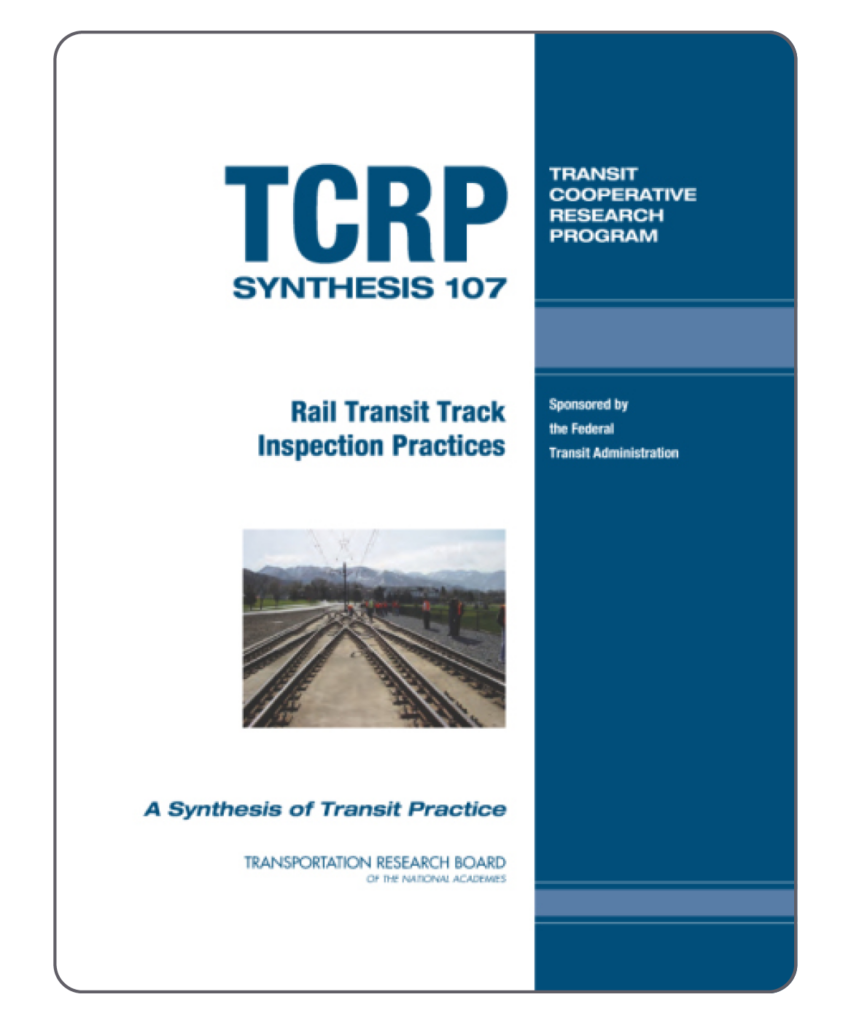
Rail Transit Track Inspection Practices
TRBs Transit Cooperative Research Program (TCRP) Synthesis 107: Rail Transit Track Inspection Practices offers information across a range of older and newer U.S. rail transit agencies on track inspection practices and policies.
Issues addressed in the report include agency staffing, agency organization and characteristics, track inspection program criteria, training and certification, procurement, and track safety practices.
Transit Cooperative Research Program (TCRP)
January 2013
TOPICS: Policy and Planning , Procurement , Safety and Health , Training
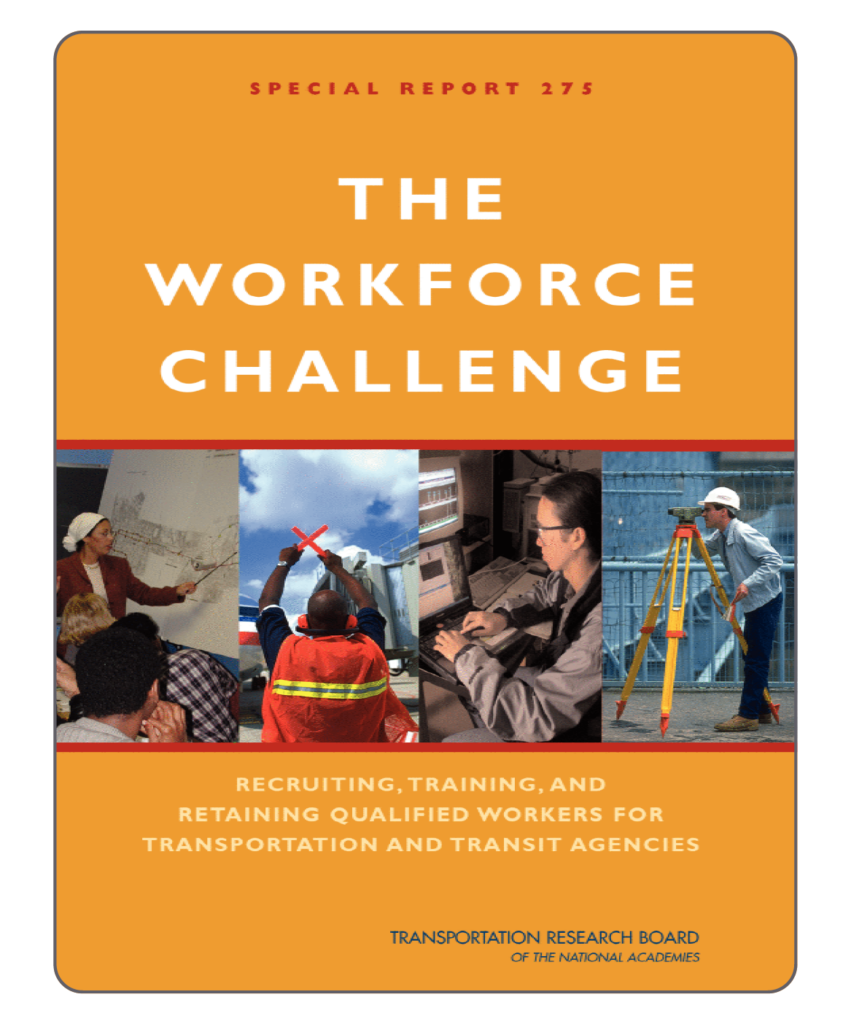
The Workforce Challenge
This report compiles research about the issues facing the transportation workforce, including changing skills, an aging workforce, and low prioritization of training. The report recommends working to expand existing federal and academic resources, create an institutional focus for the issue, and establish human resources management as a strategic function within the transportation community.
Transportation Research Board
January 2003
TOPICS: Hiring and Recruitment , Policy and Planning , Procurement , Retention , Training
Contributor(s): National Academies of Sciences, Engineering, and Medicine; Transportation Research Board; Committee on Future Surface Transportation Agency Human Resource Needs: Strategies for Recruiting, Training, and Retaining Personnel







